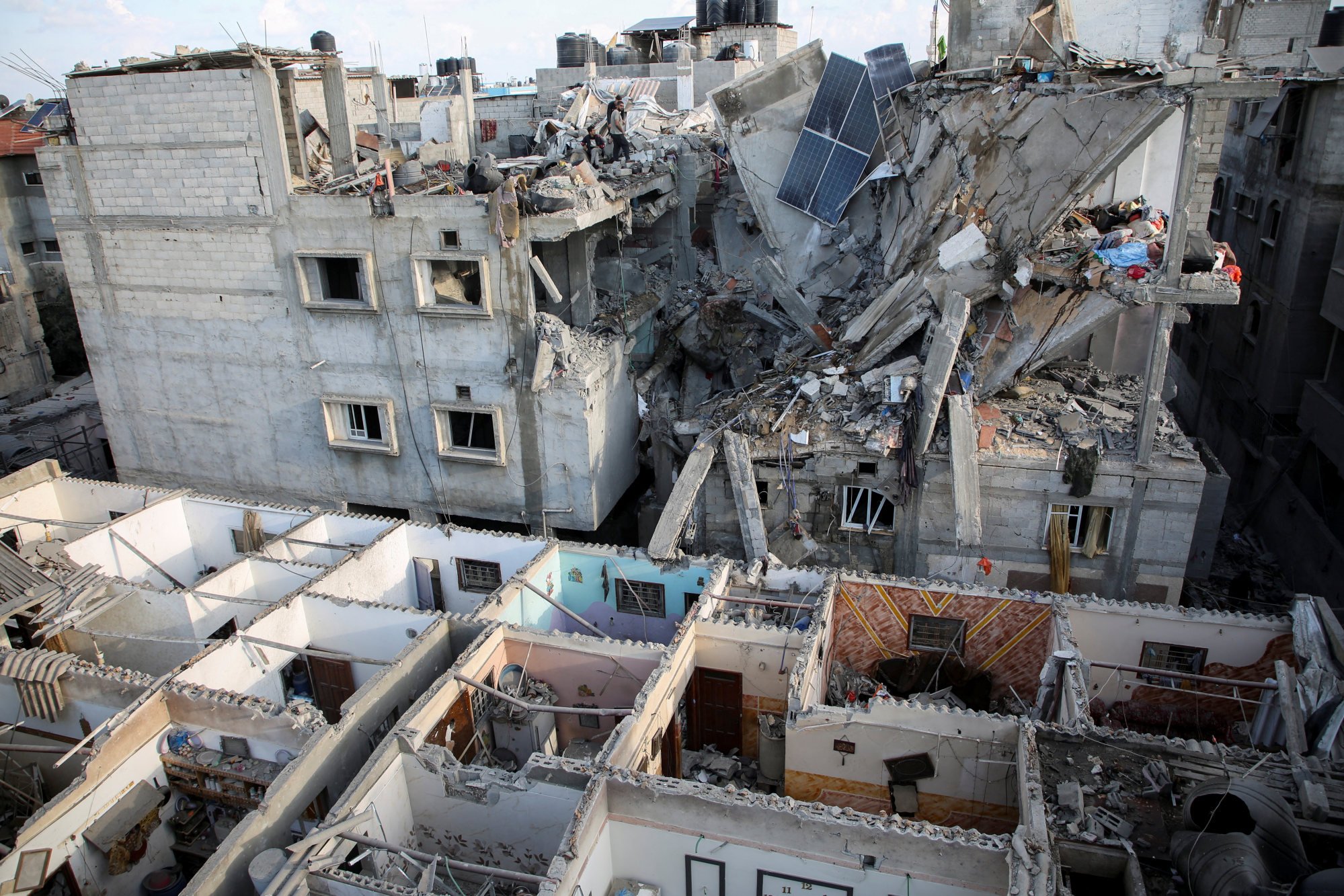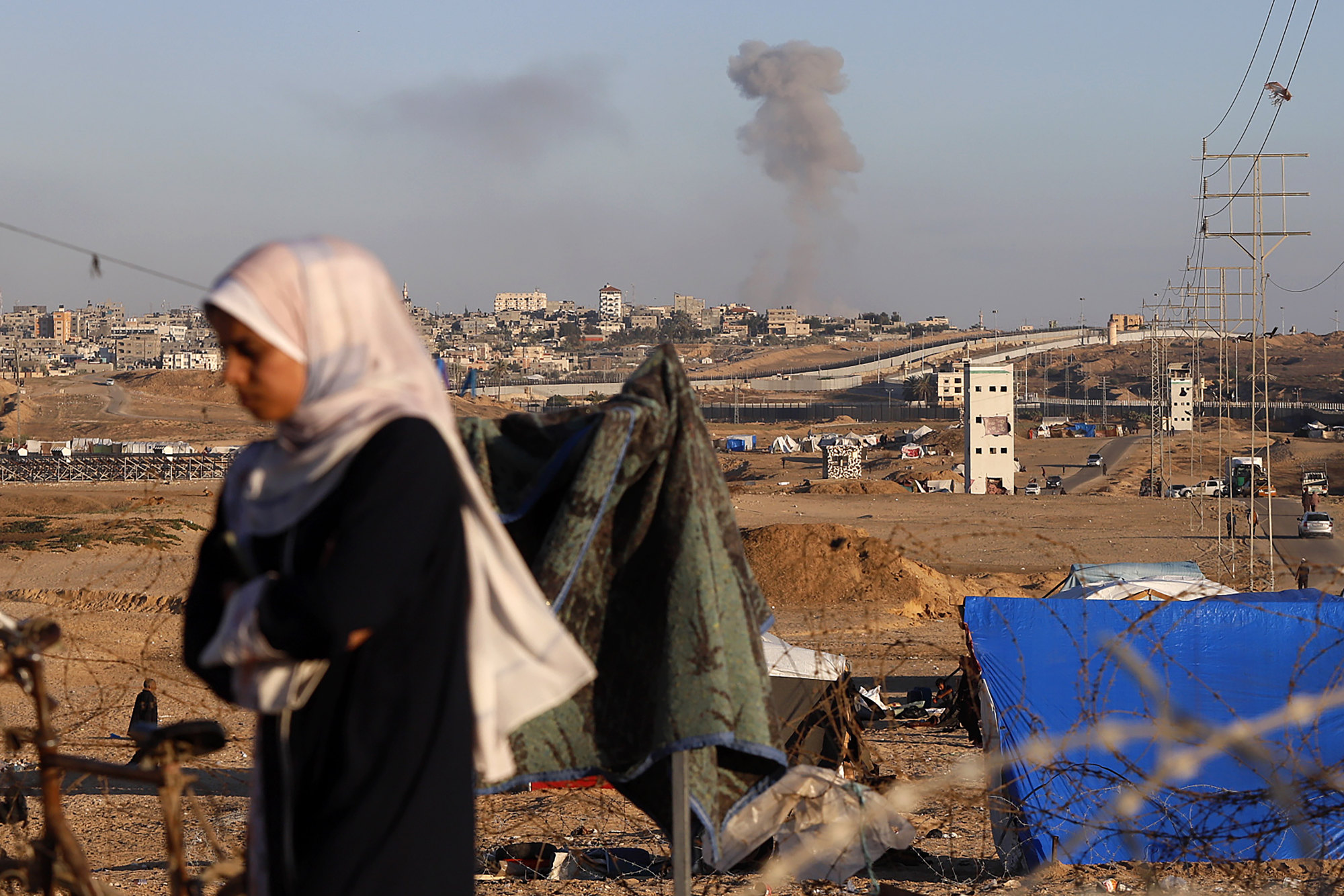
Israeli forces seize Gaza side of Rafah crossing, putting ceasefire talks with Hamas on knife’s edge
- Israeli troops seize crossing after receiving intelligence it was used for ‘terrorist purposes’
- Israel wants to use military operation in Rafah to smash remaining battalions of Hamas
An Israeli tank brigade seized control on Tuesday of the Gaza Strip side of the Rafah border crossing with Egypt as Israel moved forward with an offensive in the southern city, even as ceasefire negotiations with Hamas remain on a knife’s edge.
The development came after hours of whiplash in the Israel-Gaza war, with the militant group on Monday saying it accepted an Egyptian-Qatari mediated ceasefire proposal. Israel, meanwhile, insisted the deal did not meet its core demands.
The high-stakes diplomatic moves and military brinkmanship left a glimmer of hope alive – if only barely – for an accord that could bring at least a pause in the seven-month-old war that has devastated the Gaza Strip.
The Israeli incursion overnight appeared to be short of the full-fledged offensive into Rafah that Israel has planned, and it was not immediately known if it would be expanded.
US President Joe Biden on Monday urgently warned Israeli Prime Minister Benjamin Netanyahu against launching an offensive on the southern Gaza city, hiking pressure for a ceasefire.
On Tuesday, China expressed “grave concern over Israel’s planned launch of a ground military operation against Rafah”.
“China … strongly calls on Israel to heed the overwhelming demands of the international community, stop attacking Rafah, and do everything it can to avoid a more serious humanitarian disaster in the Gaza Strip,” Chinese foreign ministry spokesman Lin Jian said.
Egypt also condemned the Israeli military operations in Rafah, a foreign ministry statement released on Tuesday said.
It considered the move “a dangerous escalation threatening the lives of more than 1 million Palestinians who depend mainly on this crossing as it is the main lifeline of the Gaza Strip.”
The Rafah border crossing has been “the safe gateway” for those sick and wounded to get out of Gaza for treatment and for humanitarian and relief aid to enter the enclave, the statement added.
Egypt urged Israel “to exercise the maximum levels of restraint and avoid a policy of brinkmanship that has long-term effects and would threaten the fate of the strenuous efforts made to reach a sustainable truce inside the Gaza Strip.”
Aid groups say an attack would be catastrophic for the around 1.4 million Palestinians crammed into Rafah, most of whom fled Israel’s onslaught elsewhere in Gaza.
The Israeli 401st Brigade entered the Rafah crossing early on Tuesday morning, the Israeli military said, taking “operational control” of the crucial border point.
Footage released by the Israeli military showed Israeli flags flying from tanks that seized the crossing area. Details of the video matched known features of the crossing.
The military also carried out a flurry of strikes and bombardment across Rafah overnight, killing at least 23 Palestinians, including at least six women and five children, according to hospital records seen by Associated Press.
The Rafah crossing is the main route for aid entering the besieged enclave and exit for those able to flee into Egypt.

Both Rafah and the Kerem Shalom crossing between Israel and Gaza, the other main aid entry point, have been closed for at least the past two days.
Though smaller entry points still operate, the closure is a blow to efforts to maintain the flow of food, medicine and other supplies that are keeping Gaza’s population alive.
Jens Laerke, a spokesman for the UN humanitarian affairs office, warned that an assault on Rafah could break the fragile aid operation. He said all fuel entering Gaza comes through Rafah, and any disruption will halt humanitarian work.
“It will plunge this crisis into unprecedented levels of need, including the very real possibility of a famine,” he said.
The Israeli military claimed it seized the crossing after receiving intelligence it was “being used for terrorist purposes”.
The military did not provide evidence to immediately support the assertion, though it alleged the area around the crossing had been used to launch a mortar attack that killed four Israeli troops and wounded others near the Kerem Shalom crossing on Sunday.

The military also said that ground troops and air strikes targeted suspected Hamas positions in Rafah.
Wael Abu Omar, a spokesman for the Palestinian Crossings Authority, acknowledged Israeli forces had seized the crossing and had closed the facility for the time being. He said strikes had targeted the area around it since Monday.
Israel’s plans to attack Rafah have also raised fears of a dramatic surge in civilian deaths in a campaign of bombardments and offensives that has killed at least 34,789 Palestinians in the past seven months, according to Gaza health officials.
The assault has levelled large swathes of the territory, and northern Gaza has entered “full-blown famine”, the head of the World Food Program, Cindy McCain, said on Sunday.

The Rafah operation has also deepened the divide between Netanyahu and Biden over the conduct of the war.
Netanyahu says attacking Rafah – which Israel says is Hamas’ last major stronghold in the territory – is crucial to the war goal of destroying Hamas after its October 7 attack on southern Israel.
In that unprecedented Hamas raid, militants killed some 1,200 people and took around 250 others as hostages back to Gaza. Israeli critics say Netanyahu is concerned about his government’s survival, since hardline partners in his coalition could bolt if he signs onto a deal that prevents a Rafah attack.
In their call on Monday, Biden told Netanyahu that a ceasefire deal was the best way to win the return of the hostages still held by Hamas and believed to number around 100, along with the bodies of around 30 others.
As Israel announced it would push ahead with operations in Rafah, it said Monday the ceasefire proposal that Hamas agreed to did not meet its “core demands”. But it said it would send a delegation to Egypt to continue negotiations.
An Egyptian official and a Western diplomat said the draft Hamas accepted had only minor changes in wording from a version the US had earlier suggested and Israel had approved.

The changes were made in consultation with CIA chief William Burns, who embraced the draft before sending it to the Palestinian group, the diplomat and official said, speaking on condition of anonymity to discuss the internal deliberations.
The White House said Burns was discussing the Hamas response with the Israelis and other regional officials.
According to a copy released by Hamas after its acceptance, the proposal outlines a phased release of the hostages alongside the gradual withdrawal of Israeli troops from the entire enclave and ending with a “sustainable calm”, defined as a “permanent cessation of military and hostile operations”.
In the first, 42-day stage of the ceasefire, Hamas would release 33 hostages – including women, children, older adults and the ill – in return for the release of hundreds of Palestinians in Israeli prisons, and Israeli forces would partially withdraw from parts of Gaza.
The parties would then negotiate the terms of the next stage, under which the remaining civilian men and soldiers would be released, while Israeli forces would withdraw from the rest of Gaza.
Hamas has demanded an end to the war and complete Israeli withdrawal in return for the release of all hostages. Publicly, Israeli leaders have repeatedly rejected that trade-off, vowing to keep up their campaign until Hamas is destroyed.
Additional reporting by Agence France-Presse, dpa

